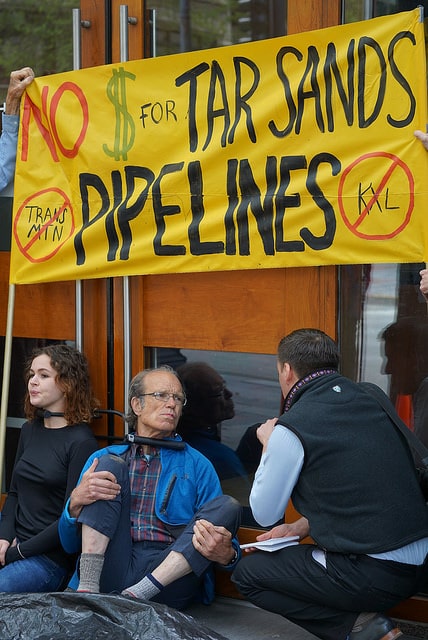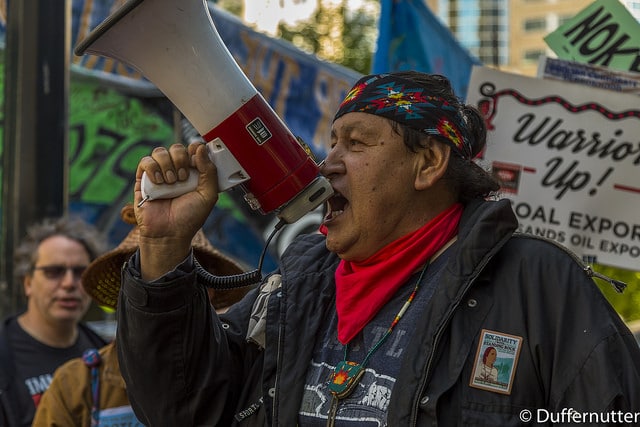Apologies for the language, but fuck JPMorgan Chase. Fuck them. Since Trump took office JPMorgan Chase has quadrupled its investments in tar sands oil and increased its financing of coal by over 2,000%. Yeah, the hurricanes may be brewing and the wildfires raging, but the 1% gotta make some more money, right? Those super yachts and caviar croissants ain’t gonna pay for themselves.
Again, fuck that. This planet is worth more than shareholder dividends, and champagne-stained chandeliers.
Now let’s rewind a year: May 8th, 2017. With over two dozen cops—all riot gear and body armor—looking on, we round danced around the foyer of the Chase Center in downtown Seattle. For over three hours, Indigenous activists led us in prayer inside the bank, burning sage and singing songs, as bewildered bank clerks looked on. We shut down thirteen banks in Seattle that day. In total, twenty-six people were arrested—the first of them will stand trial in May, exactly a year to the day after the action.
#ShutDownChase – May 8th, 2017
#ShutDownChase: On Monday May 8th, we shut down 13 branches of JPMorgan Chase to demand that they stop funding tar sands. Without the support of the big banks, fossil fuel corporations can't afford to build new devastating new tar sands projects like the Keystone XL and Trans Mountain pipelines. In other words: if we stop the flow of dollars, we stop the flow of oil.Learn more and join the campaign: www.350Seattle.org/chase & www.mazaskatalks.org#NoKXL #MazaskaTalks (video by conatzer.com)
Posted by 350 Seattle on Wednesday, May 10, 2017
When we pull off these kinds of shutdowns, it’s not necessarily about making the banks scared; it’s often just as much about making the banks scary — to shareholders, customers, investors, and so on.
And they are scary, for a lot of different reasons. Chase’s recent supercharging of the coal and tar sands industries only underlines that. But when people begin to realize just how scary the banks are, here’s the thing: they start to run for the hills. (Or if not the hills, then at least for better banks, of which there are many.)

About a year ago, the fight to #DeFundDAPL made Wells Fargo so scary that the City of Seattle divested $3 billion from the bank. And that, in turn, spooked the whole West Coast: Davis, Santa Monica, Alameda, San Francisco, Oakland, and more pulled their money. Individuals closed accounts worth more than $84 million.
"We're taking it to where it hurts–that money"#NoDAPL activists in Seattle rallied and divested from Wells Fargo to protest big banks and #DefundDAPL:
Posted by Fusion on Saturday, January 7, 2017
In July, sixteen national groups, including big wealthy beasts like the Sierra Club, 350.org, CREDO, Friends of the Earth and League of Conservation Voters, announced that they would be boycotting the banks funding the climate crisis; Indigenous activists launched Mazaska Talks, a campaign calling for everyone, everywhere to align their moola with their values and boycott the banks funding new tar sands pipelines; thousands participated in largest-ever protest of banks’ investments in fossil fuels.
#DivestTheGlobe: Wrap-up Video
What a week! With actions in over 60 cities, 10 countries and 4 continents, #DivestTheGlobe was the largest ever protest of banks investments in fossil fuels. Check out and share the #DivestTheGlobe wrap-up video! Since Standing Rock, the banks have lost billions of dollars due to their investments in fossil fuels. How many billions more will they have to lose before they realize that investing in climate devastation and abuse of Indigenous communities will not be tolerated! #DivestTheGlobe #MazaskaTalks
Posted by Mazaska Talks on Friday, October 27, 2017
And all of this matters. You see, these oil companies don’t just magic up the full billions that they need to build a new Black Snake or cancerous oil terminal. They have to do what most of us would have to do to make a big purchase: they borrow. And for that they go to the bank. DAPL, for example, was a $3.8 billion project, but $2.5 billion of that came from major bank loans. Without those loans, Energy Transfer Partners wouldn’t have even been able to break ground
So let me be clear, here is the real bottom line: If we can stop the flow of dollars from the banks to the fossil fuel companies, we can stop the flow of oil; if we can stop banks funding new fossil fuel projects, we keep the oil where it belongs—in the fucking ground.
And we can stop that flow of dollars. Honestly, some of the shit that’s been accomplished with this tactic would shock even the most optimistic of pipeline warriors. It’s one of the best ones we’ve got. Check this out:
- BNP Paribas, the world’s sixth largest bank, recently announced that it would cease all funding of tar sands, shale oil and gas and Arctic drilling
- The World Bank recently promised to cease funding of all upstream oil and gas
- Dutch bank ING has stopped financing tar sands
- Major French banks BPCE/Natixis, Crédit Agricole and Société Générale announced restrictions on tar sands financing
- Fifteen Japanese banks have committed to going entirely fossil fuel free.
And then you have JPMorgan Chase.
Not only is Chase ignoring the demands of the planet itself (stop burning the fucking oil!!!!), they are steamrolling the demands of their own shareholders. Chase is currently pleading with the SEC to allow them to block its own shareholders from introducing and voting on a resolution that would force the bank into completing a study into the financial, reputational and climate risks associated with its investments in tar sands.
It’s almost as if they fear their shareholders will vote yes.
More than any other bank, JPMorgan Chase is continuing to bury its head in the tar sand, to quadruple down on the oil and to choose short-term profits over all life on Earth.

Now is the perfect time to engage in this action. Kinder Morgan has just announced that it is ceasing all further financing of the Trans Mountain pipeline until after its shareholders meeting on May 31st due to the “significant risk” involved with the project. That’s huge: investors are clearly nervous, and with JPMorgan Chase as one of those investors (financing Trans Mountain to the tune of $243 million), now is the time to deliver a powerful message that investments in this heinous project—which spits in the face of First Nations and threatens the Southern Resident Orcas with extinction—will not be tolerated.
Organizers are calling on those with the skills and experience to consider engaging in civil disobedience as part of this action—and asking for protests and pickets for those unable to engage in civil disobedience. There is a reason for this: history has taught us that civil disobedience is a powerful force for change. From the suffragettes and the civil rights movement, to the anti-nuclear movement and the fight for gay rights, civil disobedience has been used again and again to spark deep and lasting change. Peaceful and widespread civil disobedience may be just what we need to persuade banks to stop financing projects that are incompatible with life on this planet as we know it.
Civil disobedience may also be our last best chance at preventing us from hurtling into a future of truly catastrophic climate change.

Now I don’t want to gloss over the fact that this day of action will probably inconvenience blameless bank workers and customers. This is regrettable, since workers are by no means to blame, or the target of the protest. But when attempting to shine a spotlight on the injustices of such a vast system, it can get tricky to avoid inconveniencing any regular person. And don’t think that isn’t intentional, either: the people perched at the top of the JPMorgan hierarchy would love nothing more than to look down and see everyone focusing on the bank tellers, instead of them.
But working in a bank and giving a shit about the planet we live on are not mutually exclusive. And perhaps this is what should really concern JPMorgan: I’d be willing to bet that that most of its workers—once they realize that we are sitting down in their place of work in order to prevent violence, not perpetrate it—will get where we’re coming from, and, even, quietly support us.
For they too may want a livable planet for their children.
